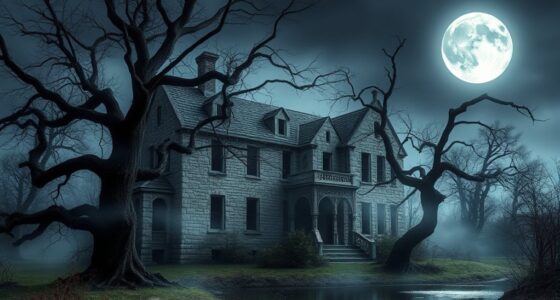Black cats often face misconceptions as either bad luck or spirit guides. In Europe, they’re seen as omens of misfortune, tied to witchcraft. However, many cultures, like ancient Egyptians and Celtic traditions, revered them as symbols of protection and mystery. Their presence is believed to support personal growth and spiritual evolution. Understanding this rich history can help shift negative perceptions about black cats and highlight their unique qualities. There’s even more to discover about their fascinating roles.
Key Takeaways
- Black cats are often viewed as bad luck in European folklore, largely due to associations with witchcraft and historical misconceptions.
- In contrast, many cultures, like ancient Egyptians, regarded black cats as spirit guides and symbols of good fortune.
- The dual perception of black cats highlights their role as protectors and mystical beings in various traditions, including Celtic folklore.
- Personal connections with black cats can lead to emotional bonds, symbolizing growth, protection, and spiritual evolution.
- Advocacy and education can help shift negative perceptions, promoting black cats as loving companions and valuable spirit guides.
Historical Origins of Black Cat Superstitions
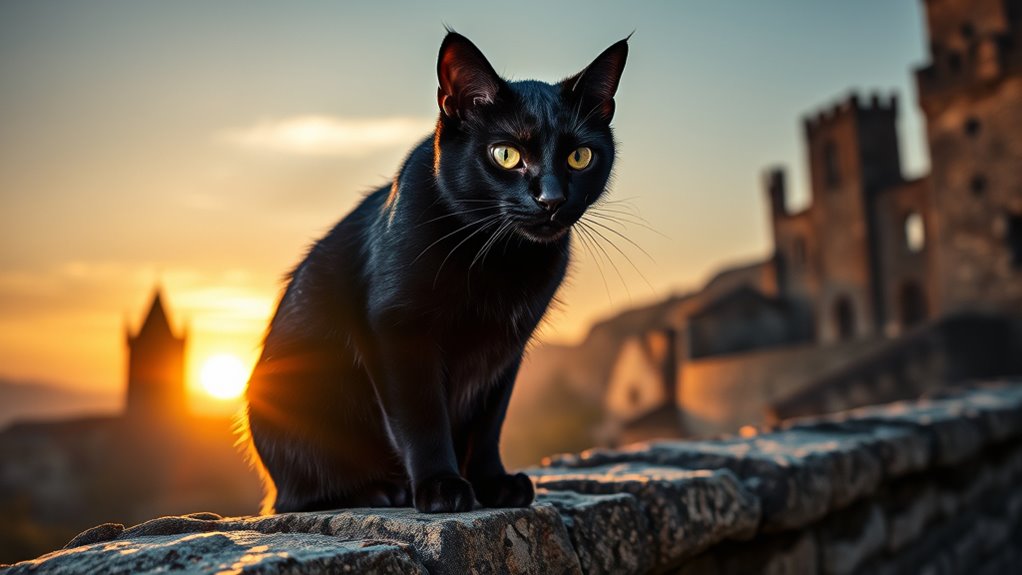
Throughout history, black cats have been entangled in a web of superstitions that often paint them as harbingers of bad luck. In European folklore, it’s believed that witches could turn into these sleek creatures, their black coats symbolizing evil and the supernatural.
This association intensified after Pope Gregory IX declared them incarnations of Satan in 1233, leading to widespread persecution during the Middle Ages. Many believed that black cats bring misfortune, particularly if they crossed your path.
Ironically, during the Bubonic plague, mass killings of cats worsened the outbreak, as rodent populations thrived. While Western cultures often view them negatively, ancient Egyptians revered black cats as divine protectors linked to the goddess Bastet, showcasing the contrasting views throughout history.
The Connection Between Black Cats and Witches
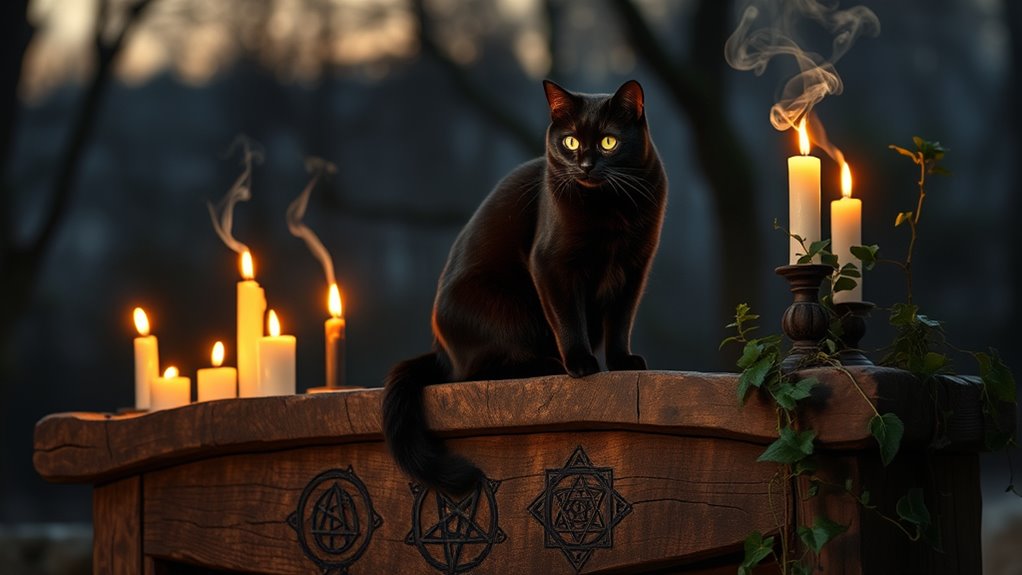
Many people often associate black cats with witches due to historical beliefs that these mysterious felines served as their familiars or even as witches in disguise. This connection has fueled superstitions, linking black cats to bad luck and witchcraft.
Black cats, often linked to witches, embody a blend of superstition and mystery, evoking both fear and fascination.
Consider these points:
- Pope Gregory IX’s decree branded them as incarnations of Satan, intensifying the fear surrounding them.
- During the Salem witch trials, many black cats were killed alongside accused witches, reinforcing their negative image.
- Conversely, cultures like ancient Egypt revered black cats, seeing them as symbols of protection and good fortune.
This duality in perception showcases how black cats straddle the line between feared witches and revered guardians, reflecting society’s complex relationship with witchcraft.
Misconceptions About Black Cats and the Plague
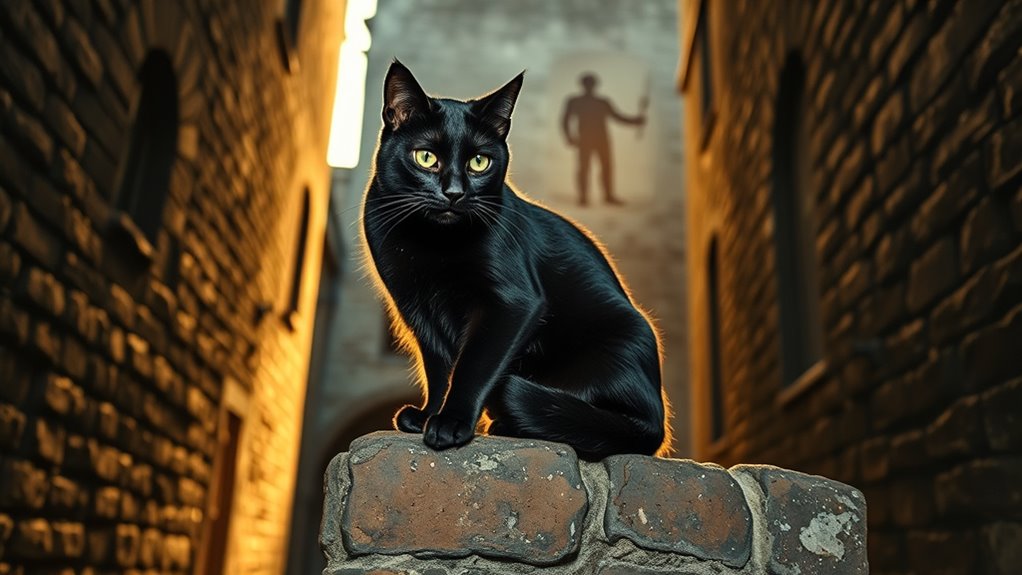
You might be surprised to learn that during the Middle Ages, black cats were wrongly blamed for spreading the Bubonic plague.
This misconception led to mass killings of these animals, ignoring their essential role in controlling the rodent population that actually spread the disease.
The fear surrounding black cats not only fueled superstition but also highlighted the tragic misunderstandings of their true nature.
Historical Blame on Cats
As the Bubonic plague ravaged Europe in the Middle Ages, a tragic misunderstanding arose that wrongfully blamed cats—especially black ones—for the spread of the disease.
This historical blame on cats led to disastrous consequences, including:
- Mass killings of cats, fueled by the Catholic Church’s decree branding black cats as associates of Satan.
- A surge in rodent populations, as the very animals that controlled them were eliminated.
- A lasting association of black cats with bad luck, perpetuating misconceptions through the Renaissance.
Ironically, these actions exacerbated the plague, highlighting the detrimental effects of hysteria against cats.
If only people had understood the crucial role cats played in keeping disease-carrying vermin at bay, the toll of the Bubonic plague might’ve been less severe.
Plague Spread Misunderstandings
While the Bubonic plague swept through Europe, misconceptions about black cats became rampant, leading to their unjust persecution. Many believed that these animals brought bad luck, associating them with witchcraft.
This hysteria resulted in the killing of countless black cats, mistakenly thought to spread the plague. Ironically, the reduction in cats led to a surge in rodent populations, worsening the very plague they were blamed for.
These misunderstandings about black cats ignored their essential role in controlling vermin and protecting human health. Instead of being seen as allies, they became scapegoats, perpetuating stigma that still lingers today.
Cats’ Protective Role Ignored
Though often overlooked, black cats played an essential role in protecting households from the very pests that spread the Bubonic plague.
Historical misconceptions and superstition linked them to witchcraft, overshadowing their true value.
Here’s how they contributed to good fortune:
- Rodent Control: Black cats kept populations of rats and mice at bay, which were the real culprits behind the plague.
- Household Guardians: Their presence deterred vermin from invading homes, creating a healthier living environment.
- Symbol of Resilience: Despite persecution, black cats demonstrated unique traits that made them resilient companions.
Instead of being seen as harbingers of bad luck, these remarkable animals should be celebrated for their protective role in history.
Cultural Variations in Black Cat Symbolism
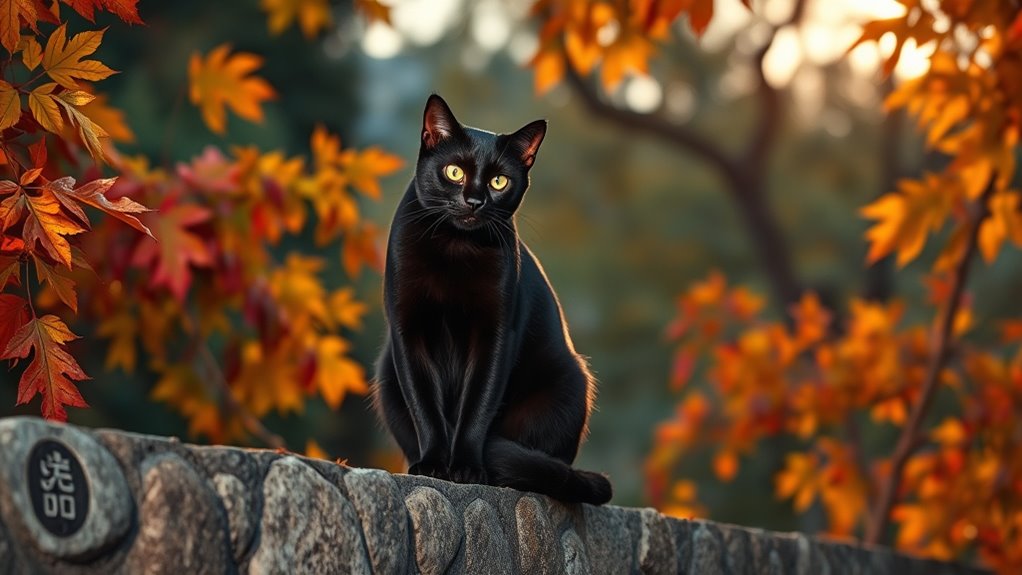
Black cats evoke a rich tapestry of symbolism across various cultures, reflecting both admiration and fear. In ancient Egypt, black cats were revered, associated with the goddess Bastet, symbolizing good fortune and protection.
Conversely, medieval Europe linked black cats to witchcraft and the devil, leading to the superstition that they brought bad luck, especially if they crossed your path.
However, in Japan and parts of England, black cats are considered omens of good luck, believed to guarantee safe voyages for sailors.
Italian folklore paints a darker picture, suggesting that a black cat on a sickbed signifies imminent death.
These cultural variations show how historical associations with the spiritual world shape our perceptions of black cats, blending admiration with superstition.
The Role of Black Cats as Spirit Guides
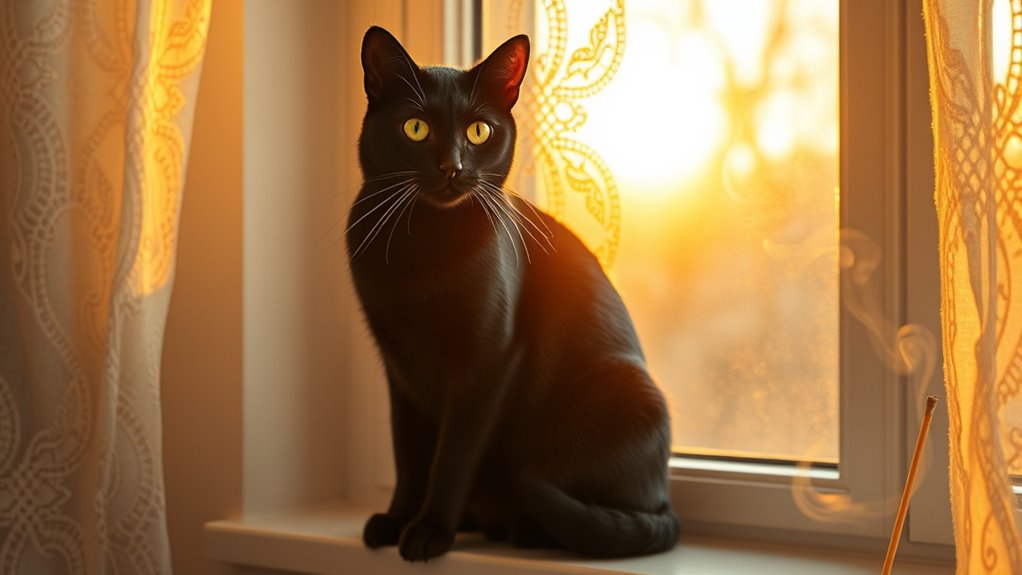
You might find it fascinating how black cats are viewed as spirit guides across different cultures.
Their symbolism often reflects protection, intuition, and transformative energy, inviting you to explore your own connections with these enigmatic creatures.
As you consider their historical perspectives and your personal experiences, you’ll uncover the deeper meanings behind their presence in your life.
Historical Perspectives on Spirit Guides
Throughout history, various cultures have embraced the idea of spirit guides, with black cats often taking on a prominent role in this belief system. In ancient Egypt, black cats were revered, symbolizing protection and good luck through their connection to the goddess Bastet.
Celtic folklore depicted them as magical beings, known as Cat Sith, serving as spirit guides with supernatural powers. Other cultures, like those in Japan and China, viewed black cats as harbingers of prosperity, emphasizing their positive spiritual connections.
Consider the following characteristics of black cats as spirit guides:
- Protectors: They safeguard homes from negative energies.
- Feminine Energy: They embody intuition and nurturing qualities.
- Transformative: They navigate between different domains, guiding your spiritual journey.
Symbolism of Black Cats
While many see black cats as mere pets, they often embody profound symbolism as spirit guides. In various cultures, these enchanting creatures are believed to possess protective qualities, offering guardianship to their human companions.
Black cats symbolize mystery and transformation, acting as intermediaries between the physical and spiritual domains. Their association with feminine energy reflects nurturing traits linked to goddesses like Bastet in ancient Egypt.
When you spot a black cat, it’s sometimes seen as a sign of good luck or a reminder that you’re under spiritual watch. Additionally, their historical ties to romantic success highlight their role as positive spiritual influences in your life, guiding you toward meaningful connections and new beginnings. Exploring the supernatural realm can reveal even deeper insights into the protective nature of these fascinating animals.
Personal Experiences and Connections
Many people who’ve encountered black cats often share stories of deep connections that transcend the ordinary pet-owner relationship.
These experiences highlight the emotional bond you can form with these mysterious creatures, viewing them as spirit guides.
Here are three aspects that illustrate this connection:
- Protection: Many believe black cats offer a shield against negativity and bad luck.
- Good Fortune: Their presence is often seen as an omen of prosperity, encouraging you to embrace new opportunities.
- Transformation: They symbolize change, guiding you through personal growth and spiritual evolution.
Through these personal connections, black cats become more than pets; they become trusted companions on your spiritual journey, enriching your life with profound insights and emotional support.
Overcoming Negative Perceptions of Black Cats
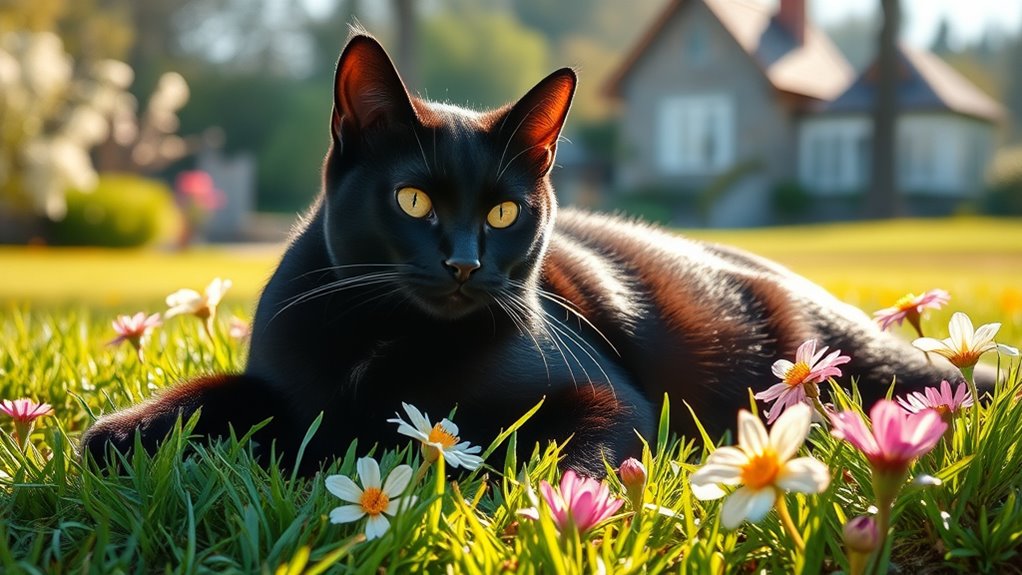
Although black cats have long been unfairly associated with bad luck and superstition, changing these perceptions is essential for their well-being. You can help dispel negative perceptions by educating others about their unique qualities.
For instance, breeds like the Bombay aren’t only striking but also friendly companions. Remember that in many cultures, black cats symbolize good fortune, contrasting with the bleak views prevalent in North America.
By advocating for black cats and sharing positive stories, you can help increase their adoption rates. Awareness campaigns have proven effective in shifting attitudes, so your efforts can make a difference.
Embrace the charm of black cats and help others see them for the loving companions they truly are.
The Importance of Responsible Black Cat Adoption
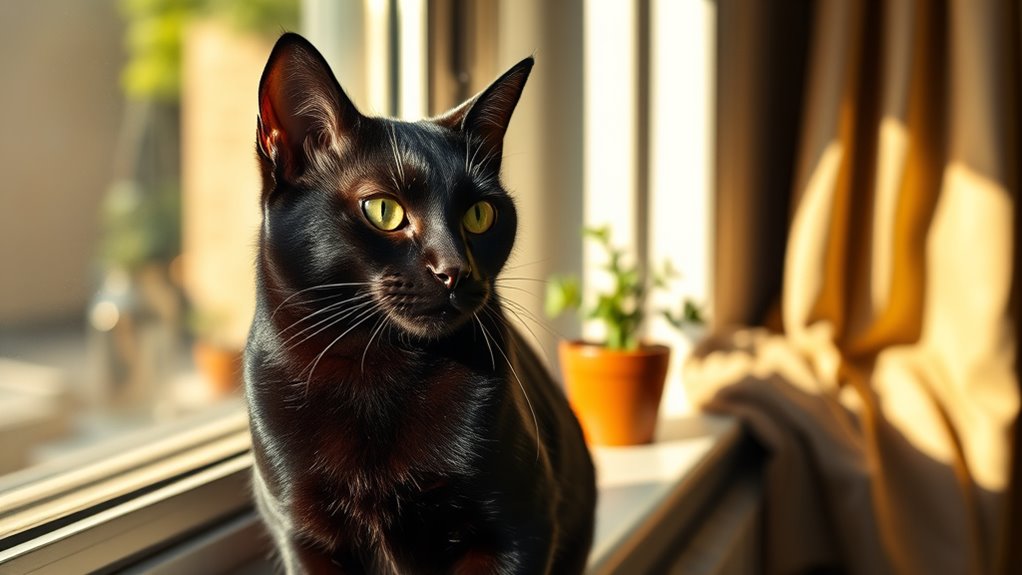
As you consider adopting a cat, it’s crucial to understand the importance of responsible black cat adoption. These beautiful creatures face numerous challenges due to misconceptions and superstitions. By choosing to adopt a black cat, you can help change their narrative.
Here’s what responsible adoption entails:
- Long-term Commitment: Black cats require your love and care for their entire lives.
- Veterinary Care: Regular check-ups guarantee they stay healthy and happy.
- Awareness Advocacy: Promoting the good luck associated with black cats helps dispel harmful myths.
With only 10% of black cats finding homes, your adoption can make a significant impact.
Frequently Asked Questions
What Do Black Cats Mean Spiritually?
When you think about black cats spiritually, you might see them as powerful symbols of protection and transformation.
They often represent inner strength and mystery, guiding you through life’s challenges. Spotting one could signal good fortune or significant changes ahead.
In many cultures, black cats embody nurturing energy and connection to the divine, reminding you to embrace your intuition and explore the hidden aspects of your life.
They’re more than just a color; they’re a spirit guide.
Do Black Cats Bring Bad Luck?
When it comes to black cats, you might wonder if they bring bad luck. Historically, many cultures associate them with negative superstitions, linking them to witchcraft or misfortune.
However, it’s important to remember that beliefs vary widely. In some places, they’re seen as lucky charms.
Instead of fearing a black cat crossing your path, consider embracing the idea that it could bring good fortune, depending on the cultural lens you choose to view it through.
Do Black Cats Keep Bad Spirits Away?
Like a shadow in the moonlight, black cats often symbolize protection and mystery.
You might find that many cultures believe these enchanting creatures can indeed keep bad spirits at bay. Their presence is thought to ward off negativity, acting as a shield against malevolent forces.
If you invite a black cat into your home, you could very well be welcoming a guardian that brings good fortune and a sense of safety.
What Does Christianity Say About Black Cats?
Christianity historically views black cats with suspicion, largely due to Pope Gregory IX’s proclamation in the 13th century.
You might find that they were labeled as companions of the devil, leading to their persecution during witch hunts. This negative perception intensified during the Salem witch trials, where black cats faced violence alongside accused witches.
However, some early Christian beliefs also recognized the protective qualities of cats, showcasing a more nuanced relationship with these creatures.
Conclusion
In the tapestry of superstition, black cats weave a thread of mystery and magic. Instead of fearing their sleek, shadowy forms, embrace the wisdom they symbolize as guides through the darkness. Each purr and playful leap can remind you that luck isn’t about color but connection. By opening your heart and home to these enchanting creatures, you’re not just dispelling myths; you’re inviting a beacon of companionship and joy into your life.


